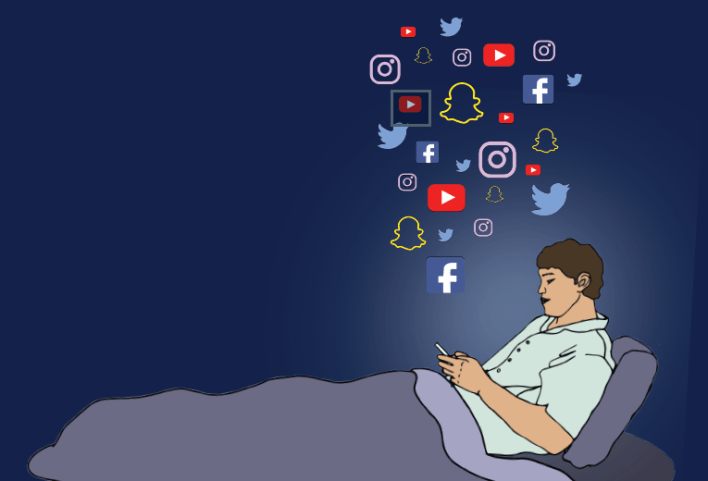
Viewing and browsing through social media has grown in popularity over the previous decade. Although most people’s usage of social media is not harmful, a tiny number of users get hooked to social media sites and indulge in extensive or obsessive use. Social media addiction is a behavioral addiction defined by excessive concern about social media, an uncontrolled need to log on to or use social media, and dedicating so much time and effort to social media that it impacts other key life areas.
Addictive social media use will resemble any other substance use disorder and may include:
- Mood modification (i.e., engagement in online activities in a favorable change in emotional experiences).
- Salience (i.e., behavioral, cognitive, and sentimental obsessiveness with social media).
- Tolerance (i.e., the ever-increasing use of social networking sites over time).
- Symptoms of withdrawal (i.e., experiencing unpleasant withdrawal symptoms).

The dopamine-inducing social settings provided by social networking sites are primarily responsible for the phenomenon of social media addiction. To keep customers using their goods as often as possible, social media sites such as Facebook, Snapchat, and Instagram generate a similar brain circuitry as is caused by gambling and recreational drugs.
According to studies, the continual flood of retweets, likes, and shares from these sites causes the brain’s reward region to elicit the same chemical reaction found with narcotics like cocaine. Neuroscientists have equated social media participation to injecting a shot of dopamine directly into the body.
CAUSES FOR SOCIAL MEDIA ADDICTION
HIGHLY APPEALING: Online platforms and internet media, in general, is addictive in some ways. The firms that manage today’s most popular social networking applications and websites work hard to improve and expand the number of individuals who can be brought into their platform, as well as to maximize the amount of time that people spend on the platform.
The more time a person invests, the more advertising they may run, and will more likely earn from their products. In the end, it boils down to business, and any successful online platform is designed for ruthless efficiency when it comes to retaining users. Thus, businesses give in their all to make the platform as appealing as possible to garner more watch time, never thinking about the negative effect it has on people especially the youngsters.

ENDLESS SCROLLING EFFECT: Development teams manipulate time by altering the flow of material when scrolling to draw maximum attention from the users. Users are unable to identify the amount of time they spend on media platforms as a result of this deception. With the occasional release of gratifying rewards amid an unexpected stream of unpleasant material, principles comparable to Skinner’s variable-ratio conditioning can be found.
This makes it harder to eliminate behavioral training. Behavioral conditioning can also be accomplished using the ‘auto-play’ feature of streaming services. The more immersed the spectator becomes, the more time distorts, making it challenging to quit viewing. Further, it is boosted by providing users a minimal time frame to cancel the upcoming media, creating false urgency coupled with the relief garnered through the media consumed.
SELF-ESTEEM: Social media can be a tremendous instrument for good, allowing individuals to keep in contact over thousands of miles, communicating at near-instant rates, engaging with communities, receiving customer feedback, and more. However, because social media entices an almost lascivious look into everyone’s life while stimulating maximum curation and reputation editing, online media frequently makes a person’s life look much more intriguing and captivating than yours, as well as much more interesting and appealing than it truly is. This may severely exploit people’s senses of social ambition and belonging, frequently making them feel inferior or less desirable.

SOCIALIZING: People who find it difficult to establish relationships or converse in person will find internet media to be an ideal medium for communication and self-expression. Although this is a good thing, it is not typically beneficial to avoid dealing with serious issues of social anxiety, especially given all of the negative mental and physical consequences of excessive screen time and internet consumption.

PERSONALISED FEED THROUGH MONITORING: Google is the first technology company to implement user content customization. This is accomplished by tracking “browsing history, interaction history, geolocation on Google and other pages, language search inquiry, internet browser and OS choice, social contacts, and time spent to make search selections.” Facebook used a similar approach to capture user approbation through Like and React buttons.
Facebook’s customization mechanisms are so accurate that they can track its users’ moods. The cumulative result is that it generates “highly fascinating, customized websites” suited to each user, which contributes to even more time online and raises the likelihood of the user adopting an addicted or hazardous social media behavior.
SOLUTIONS TO CURB THE ADDICTION
NOTIFICATION OFF: It might be tough to disconnect from social networks when your phone flashes with new notifications every minute. So switch them off. Notifications for when specific people have tweeted, for example, are diverting enough, but so many people are caught up in checking their smartphone and collecting ‘likes.’ If you do this after writing a post, it is harmful and will just generate worry. After you’ve posted what you want to, I recommend taking a break from social media for a while so you don’t become distracted by who is reacting with your post.

REMOVE PHONE WHILE YOU SLEEP: It is easy to understand how our phones disrupt our sleep patterns. 45 percent of individuals prefer to browse through social media rather than sleep. Put your phone on the opposite side of the room to avoid this. We will be less inclined to check the smartphone if it is out of reach. Reaching for your phone and scrolling through social media in bed is a common reflex. If you must get out of bed to accomplish this, you will think about why you would want your phone, and odds are you will use it less at night-time as a result.
PHONELESS MORNING ROUTINE: Similarly, try not to grab your phone immediately as you get out of bed. For many of us, checking our phones is the first thing we do in the morning. Stay away from this! Not only would this demonstrate an unhealthy reliance on our phones, but the sudden flood of material that will strike you as you browse is too much for our fatigued minds to process. This will overload and divert us, reducing our capacity to concentration for the day. Try not to grab it until you’ve gotten your bearings for the day.

DON’T GET TOO ATTACHED TO YOUR SOCIAL PRESENCE: I realize it’s easier said than done. One of the most obvious indications of social media usage is that you spend far too much time overanalyzing and over planning your postings. Anxiety and tension are caused as a result of this. You will be able to separate your thoughts from this tension if you concentrate less emphasis on how and what you post.
SPEND QUALITY READING TIME WITH BOOKS RATHER THAN E-BOOKS: We all are guilty of replacing the precious tools of knowledge – books with E-books. However, the amount of utility you may derive from reading E-books, how much you argue about the ease of reading anytime anywhere, are all excuses to use your phone. Why not sit down, keep your phone aside for an hour or two and pick whichever book you wanted to read. Don’t make reading an excuse to use your phone. Studies have shown that people who study books through their smartphone screens have less retention over time compared to those who read the physical copy of the same book.





